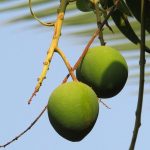The African mango, also known as Irvingia gabonensis, has been making waves in the weight-loss world. Hailing from the tropical forests of West and Central Africa, this fruit has been used for centuries for its medicinal properties. But does it live up to the hype as a miracle weight-loss supplement? Let's delve into the science behind the African mango.
**Nutritional Profile**
The African mango is a nutrient-rich fruit packed with dietary fiber, vitamins, and minerals. It's particularly high in vitamin C, which is an antioxidant that helps protect against cell damage. Additionally, it contains fiber that promotes satiety and helps regulate blood sugar levels.
**Weight-Loss Claims**
Studies have shown that the African mango may aid in weight loss. One study found that participants who consumed 300 mg of African mango extract daily for 12 weeks lost an average of 28 pounds. Another study showed that the extract helped reduce body fat percentage and improve cholesterol levels.
**How It Works**
The African mango is believed to promote weight loss through several mechanisms:
* **Appetite suppression:** The fiber content in the African mango helps you feel full and satisfied, reducing your overall calorie intake.
* **Fat oxidation:** The extract may increase the rate at which your body burns fat for energy.
* **Improved metabolism:** It may boost your metabolism, helping you burn more calories throughout the day.
**Benefits Beyond Weight Loss**
In addition to its potential weight-loss benefits, the African mango may offer other health advantages:
* **Reduces cholesterol:** The fiber in the fruit can help reduce levels of low-density lipoprotein (LDL) or "bad" cholesterol.
* **Protects against heart disease:** The antioxidants in the African mango may help protect against heart disease by reducing inflammation and oxidative stress.
* **Boosts immunity:** Its high vitamin C content supports immune function and helps fight off infections.
**Side Effects and Precautions**
The African mango is generally safe to consume. However, some individuals may experience side effects such as nausea, diarrhea, and headaches. Pregnant and breastfeeding women should avoid using the extract as there is not enough safety data available. Additionally, it may interact with certain medications, so it's essential to consult a healthcare professional before taking it.
**Conclusion**
While the African mango shows promise as a potential weight-loss aid, it's important to remember that it's not a magic bullet. Its benefits are best realized when combined with a healthy diet and regular exercise. If you're looking for a natural supplement to support your weight-loss journey, the African mango extract may be worth considering. However, always consult with a qualified healthcare professional before using any supplements.

